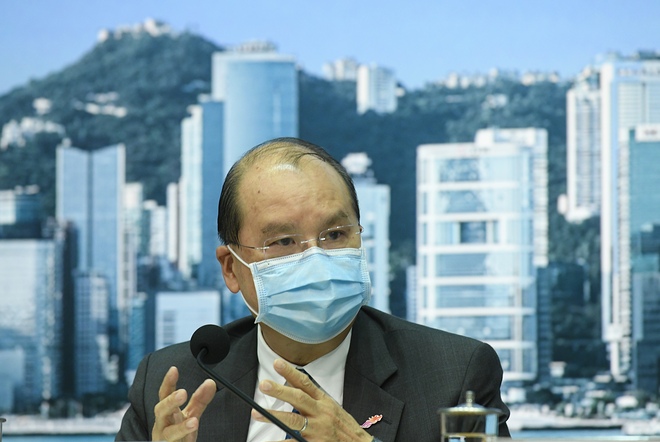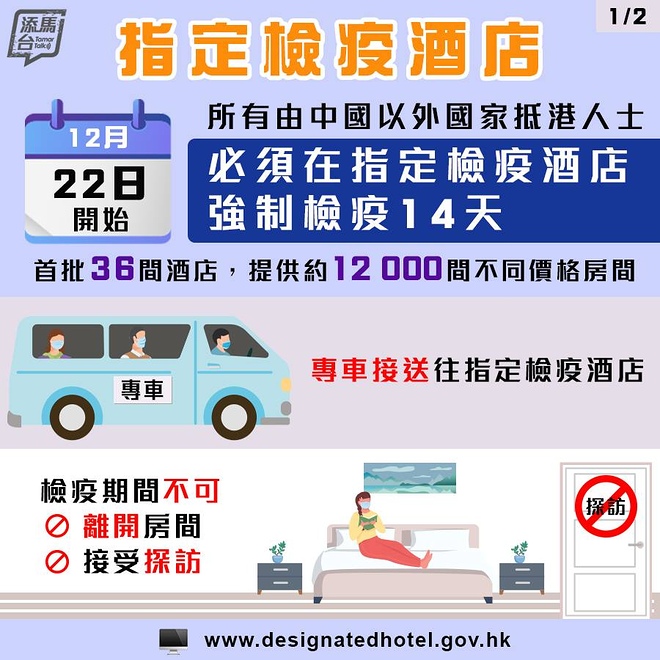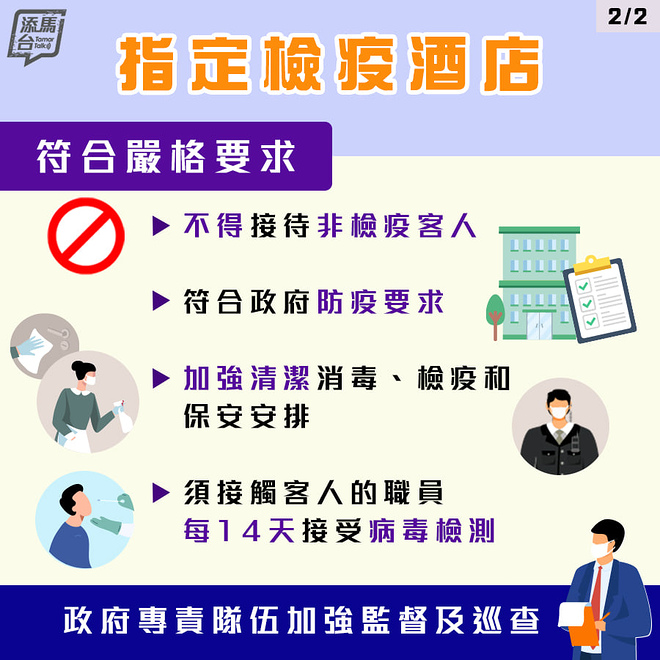Strengthen anti-epidemic measures on all fronts
First batch of vaccines to arrive next month
13 December 2020

|

|

|
In face of the persistently severe epidemic, the HKSAR Government is striving to achieve “zero infection” by remaining steadfast in preventing the importation of cases and resurgence of domestic infections as well as implementing anti-epidemic measures in a more stringent and precise manner. To minimise people flow and curb the spread of the virus in the community, the Government has already shortened dine-in hours, allowed no more than two persons per table and restricted the number of customers to no more than 50% of the normal seating capacity at catering premises, and required the closure of premises falling within 13 categories. Further measures took effect two days ago (December 11), under which the fixed penalty for non-compliance pertaining to group gatherings, mask-wearing and compulsory testing was raised to $5,000. Let me give a brief account of our latest anti-epidemic plan and strategy.
Proactively procuring vaccines and preparing for vaccination at full steam
Early universal vaccination is key to getting life back to normal. Our goal is to provide vaccination for the majority of our population within 2021 through a Government-led vaccination programme under which members of the public may receive free vaccination on a voluntary basis. For the first batch of vaccines, priority will be given to high-risk groups such as healthcare workers, elderly persons, chronic patients and staff of residential care homes for the elderly or the disabled.
Adopting a “two-pronged” strategy, the Government has on the one hand joined the COVAX Facility led by the World Health Organization to procure vaccines that will cover 35% of our local population as a form of “safety net” to cater for the most vulnerable in society, and entered into Advance Purchase Agreements with individual vaccine developers to secure additional supplies on the other.
The Government has reached a preliminary agreement with Sinovac Biotech (Hong Kong) Limited (Sinovac) to provide 7.5 million doses of vaccine for Hong Kong. The first batch of one million doses is expected to arrive in January 2021 at the earliest. We have also reached an agreement with Fosun Pharma to procure a maximum of 7.5 million doses of the mRNA vaccine developed by Fosun Pharma in collaboration with German drug manufacturer BioNTech. The vaccines supplied to Hong Kong will be produced in Europe, and the first batch of one million doses is expected to be delivered in the first quarter of 2021 at the earliest. Presuming that each person should receive two doses of vaccines, the total amount procured should be sufficient to cover our entire population. Moreover, we will procure 7.5 million doses of the vaccine jointly developed by AstraZeneca and the University of Oxford, which are expected to arrive in batches starting from the end of the second quarter of 2021 at the earliest.
In order to facilitate the early use of the vaccines in Hong Kong, it is necessary to expedite their registration process. To this end, we are working on an emergency legislation for the emergency use of vaccines with proven safety and efficacy in Hong Kong.
Strengthening measures on all fronts to prevent the importation of cases
The Government is adopting stringent entry control measures to strengthen the prevention of imported cases, with a view to keeping the virus from entering the community.
Ensuring the quality of specimen collection
Regarding specimen collection and testing for travellers arriving at the Hong Kong International Airport, there will be a new arrangement starting this Tuesday (December 15). Travellers will no longer self-collect “deep throat saliva specimens”. Instead, dedicated staff will collect “combined nasal and throat swabs” from them to ensure the quality of specimen collection.
Designating quarantine hotels and increasing the number of tests
Under the Designated Quarantine Hotel Scheme, which will be implemented with effect from 0.00 am on December 22, all travellers arriving in Hong Kong from countries outside China are mandated to undergo 14-day compulsory quarantine at designated hotels as directed under the relevant regulations. These travellers are not allowed to leave the hotels or receive visitors during the quarantine period in order to minimise the risk of virus transmission in the community. On the 12th day of quarantine, the Department of Health (DH) will arrange testing for these persons, and only those whose results are negative will be allowed to leave the hotel as scheduled after completing the quarantine. Before leaving the hotel, they will be given another specimen bottle for collection of specimens to be returned to a designated location on the 19th day of their arrival in Hong Kong. This is to ensure as far as possible that no infected cases will be left undetected even if the incubation period of the virus exceeds the quarantine period.
The first batch of 36 designated quarantine hotels, which are located in different districts, will provide some 12 000 rooms of different prices and types for travellers’ selection. The Government will closely monitor the booking rate and operation of the hotels and invite more hotels to serve as designated quarantine hotels when necessary.
Designated transportation to reduce contact with the community
To tie in with the Designated Quarantine Hotel Scheme, the Government plans to, starting from December 22, provide travellers with direct transportation to designated hotels from the airport and the hotel currently serving as the Holding Centre for Test Result, so as to reduce their contact with the community.
Substantially boosting testing volume
Meanwhile, the Government is substantially boosting the testing volume through various means, such as distributing specimen collection packs at general out-patient clinics of the Hospital Authority, post offices and MTR stations, providing specimen collection bottles for private medical practitioners, introducing the Targeted Group Testing Scheme, as well as setting up mobile specimen collection stations and community testing centres. It is estimated that up to about 80 000 specimens can be collected for testing every day. I would like to call on members of the public to make good use of these means to receive testing.
“Restriction-testing declaration”
The Executive Council has endorsed a legislative amendment to Cap. 599J to empower the Government to issue a “restriction-testing declaration” in respect of individual premises. The Government will, depending on the circumstances of individual premises, invoke the power when necessary to restrict the movement of persons on designated premises and subject them to compulsory testing. A “people-oriented” approach will be adopted to ensure as far as possible that individuals affected by the declaration will be given appropriate assistance. The Social Welfare Department and the Home Affairs Department will provide support for persons with special needs.
Zero tolerance for non-compliance
Last Thursday and Friday, four persons were sentenced by the magistrates’ courts for breaching compulsory quarantine orders. As at December 11, a total of 82 persons have been convicted by the courts for breaching compulsory quarantine orders and sentenced to imprisonment of up to three months or a fine of $15,000. Once again, I would like to remind those who are subject to compulsory quarantine orders that they should abide by the law and strictly comply with the regulation, and fulfil their civic responsibility by co-operating with the Government. Breaching a quarantine order is a selfish act which shows a total disregard for public health and safety. The Government will follow up these cases in a serious manner with zero tolerance.
Enhancing the “LeaveHomeSafe” App
The Government’s “LeaveHomeSafe” mobile app has had over 360 000 downloads since its launch in mid-November, and the scheme has been well-received by various sectors1.
Catering premises and scheduled premises in operation are required to display the app’s QR code at a conspicuous location. To achieve a deterrent effect, government departments will carry out designated patrols and step up enforcement actions against premises which have violated the requirement. From December 2 to 11, the Food and Environmental Hygiene Department (FEHD) conducted a total of 8 229 inspections and all the catering premises inspected were regarded as complying with the requirement, including 31 cases which had been given verbal warnings. Yesterday, the FEHD initiated prosecution procedures against the responsible persons of three catering premises for failing to display the poster containing the “LeaveHomeSafe” QR code properly.
I would like to call on all sectors concerned to strictly comply with the above requirement. Apart from the catering premises and scheduled premises required by law, the Government will continue to solicit and encourage participation from more sectors and business establishments to facilitate citizens using the app for recording their whereabouts.
Since the launch of the app, unceasing efforts have been made to enhance its operation having regard to the views of the public and sectors concerned, so that the public may feel more at ease in using it. For example, the access permission required by the app has been updated and three new functions have been incorporated, which include review of personal visit records, auto check-out of a venue at a pre-set time and simplified steps for entering a different venue by simply scanning a different QR code. Once again, I appeal to members of the public to download the “LeaveHomeSafe” mobile app and scan the QR code every time when entering a venue. It can help protect ourselves and others, making everyone feel safe when leaving home.
Announcing measures to support hard-hit sectors soonest possible
The tightened social distancing measures may remain in place for a period of time, which will deal a heavy blow to certain sectors. The Government will study how further support can be provided for sectors hard hit by those measures, in particular premises ordered to cease operation. The details will be announced soonest possible.
Conclusion
The Government will make an all-out effort to procure vaccines and prepare for a large-scale vaccination programme at full steam. Epidemic prevention is by no means achieved by luck but by the public’s awareness and action. I sincerely appeal to members of the public to suspend social activities and family meals at this critical time. After all, staying home to fight the virus will help ensure a peaceful and healthy Winter Solstice and Christmas for everyone.
1 Currently, over 63 000 public and private venues have participated in the scheme, of which over 50 000 are private ones. The mobile app can also be used directly in about 18 000 taxis across the territory.

